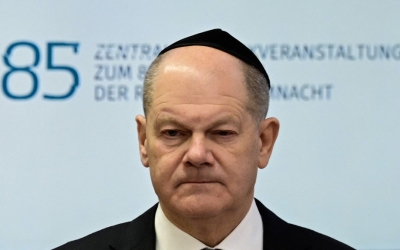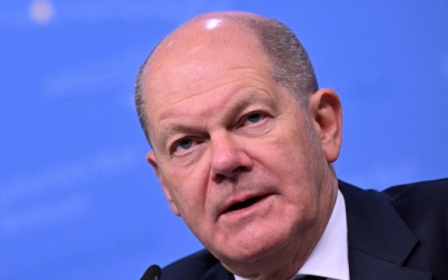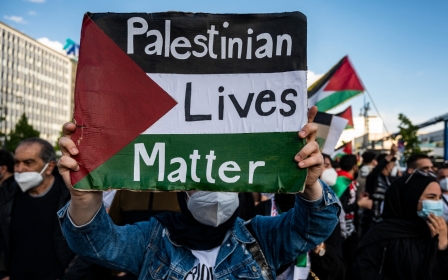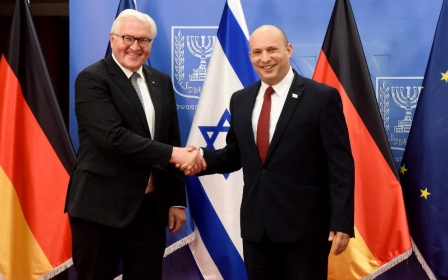War on Gaza: How Germany's left has failed Palestinians
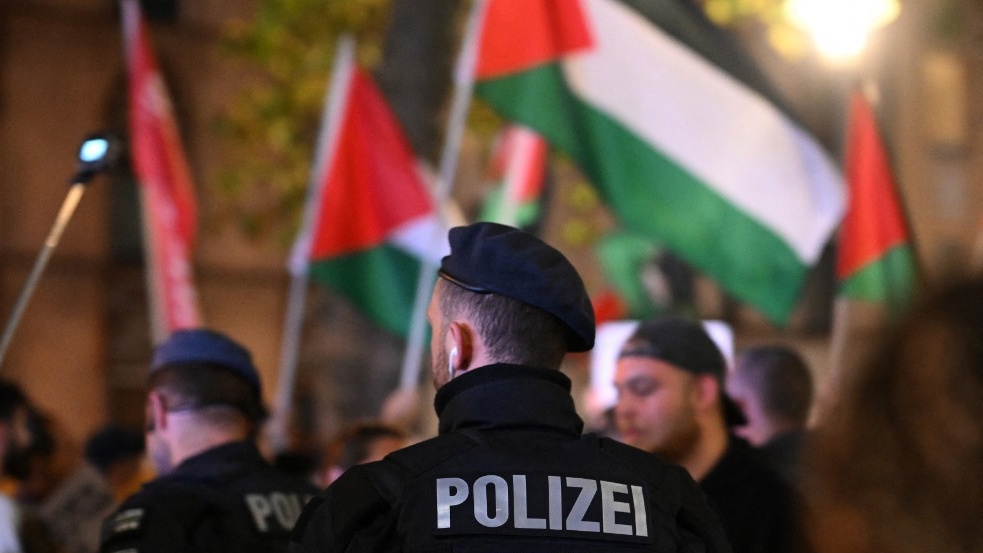
In recent weeks, millions of people have taken to the streets in cities across Germany to demonstrate against the far right, and specifically against the Alternative fur Deutschland (AfD) party.
The protests followed revelations by an investigative media outlet that far-right politicians held a secret meeting with well-known neo-Nazis in November, where they discussed a plan for the mass deportation of foreigners and Germans deemed not to be German enough.
While the protests are welcome, what has been glaringly absent from many demonstrations is a clear expression of solidarity with those currently most targeted by racism: people of colour standing in solidarity with Palestinians.
While one protest callout specifically listed antisemitism as a form of racism, it did not mention Islamophobia, despite the fact that Muslims, together with Black and brown migrants, are the main targets of the AfD, which is also staunchly pro-Israel.
In October, the party demanded that humanitarian aid to Palestine be stopped, and after pro-Palestine actions, it called for the deportation of activists. The fact that government officials took part in anti-racism demonstrations while simultaneously enacting policies advocated by the AfD, albeit watered-down versions, shows that their anti-racism stance is mere lip service.
The recent anti-racism protests seemed geared towards appeasing the Israel lobby, distinguishing themselves from recent pro-Palestine protests. This created a situation where some non-white Palestine supporters were reportedly targeted, with one affected person commenting: “After the nationwide anti-fascism demos, while white people were congratulating each other, Arabs were checking on each other. Business as usual.”
This highlights a much broader problem in the German left: it does not have a clear position on Palestine. This may be due to the perverse notion that internalised guilt over the Holocaust can somehow be absolved by unconditional support for Israel, or because speaking out for Palestinians in the current German climate means instant cancellation.
Weak statement
In November, after Greta Thunberg declared her support for Palestine, the German chapter of her Fridays for Future movement distanced itself from the climate activist. Carola Rackete, a leading candidate for the upcoming European parliamentary elections with the German leftist party Die Linke, said in an interview that she could understand the criticism of Thunberg.
This fits with the party line of Die Linke, which has been notably silent on Gaza, apart from a few voices. According to Die Linke politician Christine Buchholz, the party’s current positioning “is absolutely inadequate, as it tries to maintain a balance between criticism of Israel and criticism of Hamas”.
Follow Middle East Eye's live coverage of the Israel-Palestine war
After an initial weak statement on 11 October that solely blamed Hamas for the escalation in Gaza, Die Linke’s leadership seemed to hope its members (and potential voters) would just forget about the topic.
When former Die Linke MP Buendnis Sahra Wagenknecht called Gaza an “open-air prison” on 23 October, the party’s parliamentary group leader “strongly distanced” himself from her. Pressure from progressive streams in the party to adopt stronger language calling for a ceasefire was voted down at the party conference, and their new basic programme fails to mention Israel and Gaza.
If the German left truly wants to renew itself, it should shake off its fear and hypocrisy, and take a strong stand for the freedom of the Palestinian people
There was no response when Germany announced it would intervene on Israel’s behalf at the International Court of Justice (ICJ). And while Die Linke officially decided to support the Israeli peace movement and Israeli parliamentarian Ofer Cassif, who faces expulsion from the Knesset for supporting South Africa’s ICJ case, no such solidarity statements with Palestinians can be found.
The same criticism applies to the leadership of the Rosa Luxemburg Foundation, which is affiliated with Die Linke. In a leaked letter from November, staff at their Palestine and Jordan office slammed the foundation’s weak stance on Gaza, criticising “the systematic suppression of Palestinian voices and the perpetuation of the oppressor’s narrative”.
Core values
Die Linke would be well-advised to return to its core values after its dismal election results in the past few years and an internal split last year. Ten of its 38 MPs, led by Wagenknecht, left the party, which consequently lost its status as a faction in the German parliament.
Wagenknecht subsequently founded her own party, Bundnis Sahra Wagenknecht (BSW), which could jeopardise Die Linke’s existence. While the new party’s policies are anything but progressive, and its stance on migration can almost be called right-wing, it presents itself as the only party that truly stands for peace.
Wagenknecht has accused Israel of “ruthless warfare”, while her husband and fellow party member Oskar Lafontaine said it is committing “war crimes”. He qualified that, however, by saying it is Germany’s duty to stand up for Jews and for the state of Israel. It remains to be seen what will become of this position in practice.
Following the party’s split, Die Linke promised to renew itself. But its weak performance in the polls (the latest survey put it at 3.5 percent nationally, compared to 7.5 percent for the rival BSW) shows that people on the left spectrum have become disenchanted.
Many of them, especially young people of colour or those with a migrant background, feel that a strong position on Palestine is a make or break for any party that wants their vote.
Activist Rosa Luxemburg once wrote: “The most revolutionary thing one can do is always to proclaim loudly what is happening.”
After the ICJ’s recent ruling, there can be no more excuses: any political actor who does not clearly position themselves against Israel’s actions is silently assenting to the ongoing genocide.
If the German left truly wants to renew itself, it should heed Luxemburg’s call, shake off its fear and hypocrisy, and take a strong stand for the freedom of the Palestinian people.
The views expressed in this article belong to the author and do not necessarily reflect the editorial policy of Middle East Eye.
Middle East Eye propose une couverture et une analyse indépendantes et incomparables du Moyen-Orient, de l’Afrique du Nord et d’autres régions du monde. Pour en savoir plus sur la reprise de ce contenu et les frais qui s’appliquent, veuillez remplir ce formulaire [en anglais]. Pour en savoir plus sur MEE, cliquez ici [en anglais].



